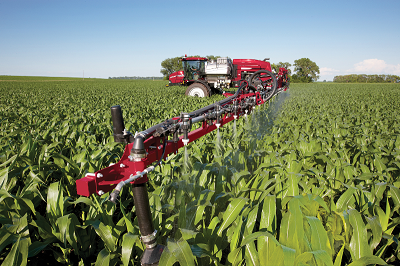
With tough to control and resistant pests starting to emerge to take their toll on your crop, now is the time to implement an effective pest control program. There is more to it than simply picking the right chemical and utilizing the labeled rate. The correct adjuvants, at the right rates, can make a pesticide program more effective at controlling those hard to control pests. In this article I will discuss the types of adjuvants and their uses. Rates can vary between manufacturers so always read the label.
Adjuvants can be broken down into many categories. The first I will discuss is tank management and spray droplet management. Tank cleaners obviously have an effect on the crop, in preventing contamination from the pesticide that was in the tank in a prior application. Not all tank cleaners are the same and often times you get what you pay for. Utilizing an effective tank cleaner, like FS RinseOut, will effectively remove prior pesticide residues. Drift management not only reduces drift to non-target areas, but also helps ensure that the pesticide is reaching its target at the proper rate.
Ammonium sulfate (AMS) based adjuvants come in many forms and concentrations. Ammonium sulfate's main purpose is to condition the water. It does this by tying up the hard water ions. If not utilized, those hard water ions attach to the pesticide molecules and affect pesticide performance. Ammonium also helps the pesticide penetrate the leaf surface by disrupting the waxy cuticle on the leaf surface. Rates on AMS vary based on the pesticide and the environmental conditions.
Water conditioners can perform similarly to AMS, but are not a replacement for AMS. They are effective at disrupting the waxy cuticle and assisting the pesticide to enter the leaf. Water conditions are widely used with glyphosate applications. The main advantage to them is they are lower use rates than liquid AMS products. Like AMS products, water conditioners vary in quality, additives, and price.
Nonionic surfactants (NIS) are often referred to as spreader stickers' adjuvants. Nonionic surfactant has no interaction with the pesticide molecule. Instead, it affects the water droplet. NIS reduces the surface tension of the droplet, allowing the droplet to spread out on the leaf surface. At the same time NIS can also make the droplet "sticky". NIS can also affect the leaf surface and assist a pesticide in penetrating the leaf. There is a wide range in qualities of nonionic surfactants. Look for NIS that is CPDA certified, which is now the industry standard.
Oils are another wildly used adjuvant. Crop oil concentrates are mostly made of soybean oil and contain emulsifiers that allow the oil and oil based pesticides to go into solution and remain in solution. Oils also affect the waxy cuticle on the leaf surface allowing the pesticide to penetrate the leaf. Methylated seed oils (MSO) are made out of a variety of oils, most common is soybean. Certain pesticides require a methylated oil to work properly. MSOs provide the same function as COC on the leaf surface. Rates and qualities vary between manufacturers.
It is important to utilize the correct adjuvant with the pesticides you are putting in the tank. For more information please contact your local FS Crop Specialist.
Orignally published in Iowa Spokesman, Nate Pierce serves the FS System as GROWMARK’s Crop Protection Territory Manager. He can be reached at [email protected]